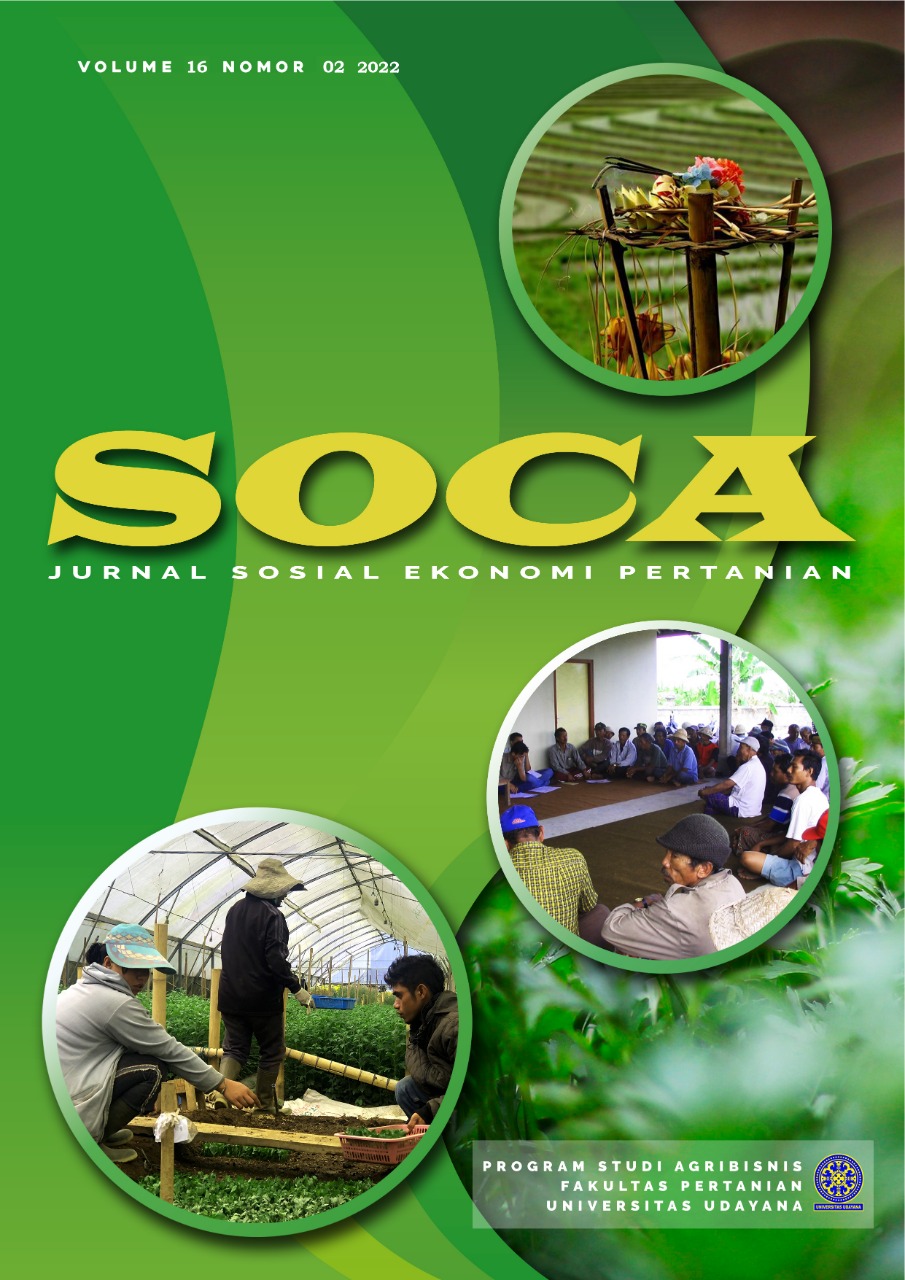Prospective Analysis of The Coffee Agrotourism Business
Abstract
Sustainable tourism will be carried out well if the community participates. However, agro-tourism in Catur Village has not been able to develop and make a positive contribution to the community. The objectives of this study are to find out the problems faced in the framework and the role factors of agro-tourism development in Catur Village, Kintamani District, Bangli. This study used prospective analysis. The type of data used in this study is primary data obtained from informants, namely: agro-tourism businesses, farmers, government, community groups, tourism operators, through focus group discussions (FGD) and interviews. The key element matrix analysis was performed with MICMAC (Matrix of Cross Impact Analysis) analysis. The results showed that Catur Village have the potential for agro-tourism development, but there are still some problems, such as lack of community knowledge and skills related to agro-tourism, inadequate marketing techniques, lack of vision and strategy, and lack of optimal institutions. The factors that influence the development of agro-tourism are environment and culture, integration relations, facilities and infrastructure, institutions, and social society
Downloads
References
Bringas R., N. L., & Gonzalez A., J. I. I. (2004). El turismo alternativo: una opción para el desarrollo local en dos comunidades indígenas de Baja California. Economía Sociedad y Territorio, 4(5), 551-588. https://doi.org/10.22136/est002004421
Busby, G., & Rendle, S. (2000). The transition from tourism on farms to farm tourism. Tourism Management, 21(6), 635-642. https://doi.org/10.1016/S0261-5177(00)00011-X
Dritsaki, C. (2009). The life cycle of agro tourist enterprises. Tourismos, 4(2), 149-154.
Dyer, P., Aberdeen, L., & Schuler, S. (2003). Tourism impacts on an Australian indigenous community: A Djabugay case study. Tourism Management, 24(1), 83-95. https://doi.org/10.1016/S0261-5177(02)00049-3
Fauzi, A. (2019). Teknik Analisis Keberlanjutan. Jakarta: Gramedia Pustaka Utama.
Guerreiro Marcon, E. M. (2007). O turismo como agente de desenvolvimento social e a comunidade Guarani nas ¿Ruínas Jesuíticas de São Miguel das Missões¿. PASOS Revista de Turismo y Patrimonio Cultural, 5(3), 343-352. https://doi.org/10.25145/j.pasos.2007.05.025
Inskepp, E. (1991). Tourism Planning: An Integrated and Sustainable Development Approach. New York: World Tourism Organization.
Kayat, K. (2010). The nature of cultural contribution of a community-based homestay programme. Tourismos, 5(2), 145-159.
Kibicho, W. (2008). Community-based tourism: A factor-cluster segmentation approach. Journal of Sustainable Tourism. 16(2), 211-231. https://doi.org/10.2167/jost623.0
Lepp, A. (2007). Residents’ attitudes towards tourism in Bigodi village, Uganda. Tourism Management. 28(3), 876-885. https://doi.org/10.1016/j.tourman.2006.03.004
López-Guzmán, T., Sánchez-Cañizares, S., & Pavón, V. (2011). Community - based tourism in developing countries: A case study. Tourismos 4(1), 84-97. https://doi.org/10.25145/j.pasos.2006.04.006.
Manyara, G., & Jones, E. (2007). Community-based tourism enterprises development in Kenya: An exploration of their potential as avenues of poverty reduction. In Journal of Sustainable Tourism. 15(2), 628-644. https://doi.org/10.2167/jost723.0
McGehee, N. G. (2007). An agritourism systems model: A Weberian perspective. Journal of Sustainable Tourism. 15(2), 111-124. https://doi.org/10.2167/jost634.0
Nnadi, F., & Akwiwu, C. (2005). Potentials Of Agro-Tourism For Rural Development In Nigeria. Journal of Agriculture and Social Research (JASR). 5(1), 96-100. https://doi.org/10.4314/jasr.v5i1.2835
Nyaupane, G. P., Morais, D. B., & Dowler, L. (2006). The role of community involvement and number/type of visitors on tourism impacts: A controlled comparison of Annapurna, Nepal and Northwest Yunnan, China. Tourism Management. 27(6), 1373-1385. https://doi.org/10.1016/j.tourman.2005.12.013
Okazaki, E. (2008). A community-based tourism model: Its conception and use. In Journal of Sustainable Tourism. 16(5). 511-529. https://doi.org/10.2167/jost782.0
Parra López, E., & Calero García, F. J. (2006). Agrotourism, sustainable tourism and Ultraperipheral areas: The Case of Canary Islands. PASOS Revista de Turismo y Patrimonio Cultural. 4(1), 84-97. https://doi.org/10.25145/j.pasos.2006.04.006
Rastegar, H. (2010). Tourism development and residents’ attitude: A case study of Yazd, Iran. Tourismos. 5(2), 203-211.
Ruiz Ballesteros, E., Hernández Ramírez, M., Coca Pérez, A., Cantero, P. A., & Campo Tejedor, A. del. (2008). Turismo comunitario en Ecuador.: Comprendiendo el community-based tourism desde la comunidad. PASOS Revista de Turismo y Patrimonio Cultural. 6(3), 399-418. https://doi.org/10.25145/j.pasos.2008.06.031
SASTRAYUDA, G. S. (2010). Konsep Pengembangan Kawasan Agro Wisata. 1–27. http://file.upi.edu/Direktori/FPIPS/LAINNYA/GUMELAR_S/HAND_OUT_MATKUL_KONSEP_RESORT_AND_LEISURE/PENGEMBANGAN_KAWASAN_AGRO_WISATA.pdf
Sonnino, R. (2004). For a “piece of bread”? Interpreting sustainable development through agritourism in southern Tuscany. Sociologia Ruralis. 44(3), 285-387. https://doi.org/10.1111/j.1467-9523.2004.00276.x
Usman, S. (2010). Pembangunan dan Pemberdayaan Masyarakat. Yogyakarta Pustaka Pelajar.
Wijaya, P. Y., Kawiana, I. G. P., Suasih, N. N. R., Hartati, P. S., & Sumadi, N. K. (2020). Swot and micmac analysis to determine the development strategy and sustainability of the bongkasa pertiwi tourism village, Bali Province, Indonesia. Decision Science Letters. https://doi.org/10.5267/j.dsl.2020.3.002
Yoga, I. M. S., Yonce, A. F. E., & Putra, W. A. E. (2017). Evaluasi Community-based Tourism Terhadap Perkembangan Sosial Ekonomi Masyarakat Lokal Pantai Pandawa, Bali. Prosiding Seminar Dan Call For Paper 20-21 Oktober 2017, Fakultas Ilmu Sosial Dan Ilmu Politik Universitas Muhammadiyah Sidoarjo, Sidoarjo - Indonesia, 1–6.
Zorn, E., & Farthing, L. C. (2007). Communitarian tourism hosts and mediators in Peru. Annals of Tourism Research. 34(3), 673-689. https://doi.org/10.1016/j.annals.2007.02.002













